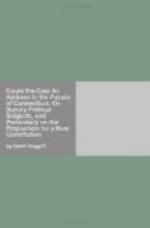It is not enough to tell us that men will be selected of more virtue and talents than those now in power—such a pretence is vain—no man in his senses will regard it—no man makes such a pretence but for wicked purpose. If we are directed to turn our eyes to those who for years past have been held up in the unsuccessful nominations, and are told that these are to be substituted for the men who now guide our Councils, what are we to expect? An appeal may be made to every man not bewildered in this new and destructive madness—he may be asked who among these men stand-forth with fair claims to public confidence? Where among them, can be found the polished scholar—the able civilian, the enlightened judge? Do we see in a single individual an assemblage of talents united with virtue sufficient to qualify him for the seat of justice? If there are such men they have hitherto hid their talents I the earth. It will not here be forgotten that the attempt is, to reject men long known and respected, and to fill their places with those who are without a witness in their favor.
A still more mischievous and alarming project is, that of making a new Constitution for Connecticut. This project originates entirely in a spirit of Jacobinism—it is a new theme on which to descant to effect a revolution in Connecticut. The object is, by false assertions, to induce a belief that no Constitution exists and that tyranny prevails. This party always address the passions and never the understanding.—Review their measures for a few years, and you will distinctly perceive their motives and aims.
To create disaffection and hatred towards those who formerly administered the general Government, it was boldly asserted that the treasury had been plundered. Even the illustrious Saviour of his Country was accused of embezzling public money, and his followers could not expect a less happy fate. Men of the most unsuspected integrity, were openly attacked by anonymous publications, or dispoiled of their good name by secret insinuations. These calumnies were kept in circulation by their authors till impudence itself was abashed, and the object in view obtained—not a tittle of proof was ever adduced, and investigation always shewed that the charges were not only false, but entirely groundless.
For the same unworthy purpose it was asserted in every circle of opposition that salaries were too high, and the incomes of office enormous. Every tavern resounded with this grievance. At length the principal authors of this clamor got into place, and the clamor was hushed. Yes, men who urged the people of Connecticut almost to rebellion on this account, stept into the places and, without a blush, took more from the people than their predecessors. Look at Mr. Babcock’s paper in 1799 and 1800, and see its columns filled with railing against high salaries—Look at it since Abraham Bishop takes 3000 dollars a year, and Alexander Wolcott more than four, and find, if you can, a complaint on this subject. Such meanness, such baseness, such hypocrisy in office seekers, exhibit in strong colors the depravity of human nature and teach us what dependence may justly be placed on pretensions and professions.




